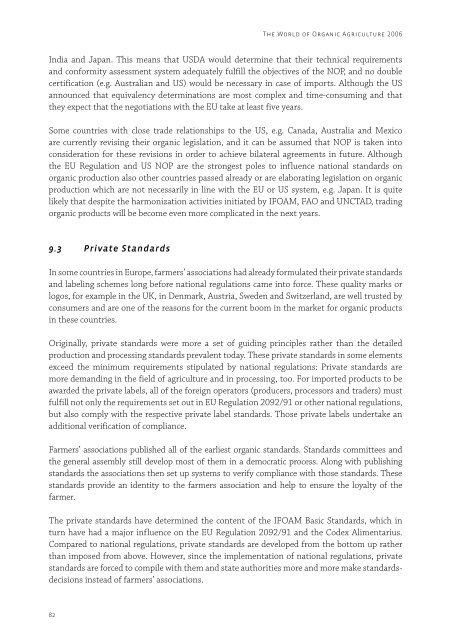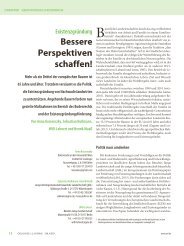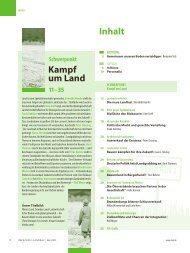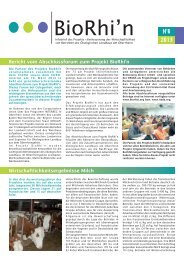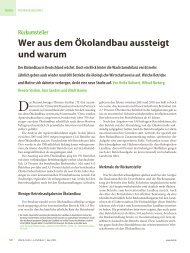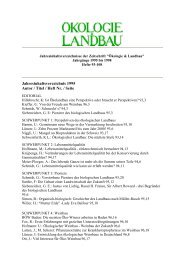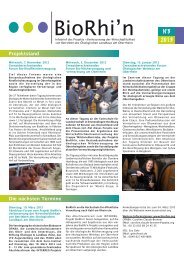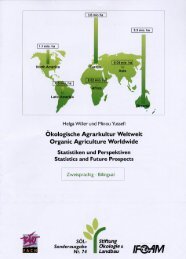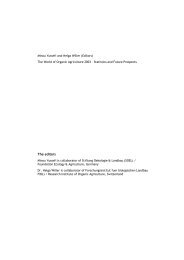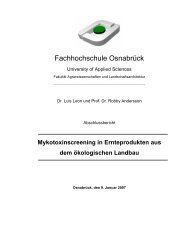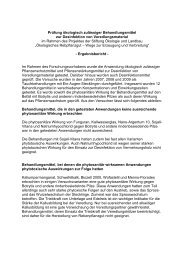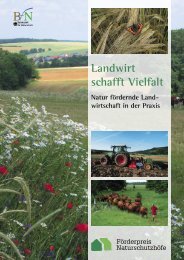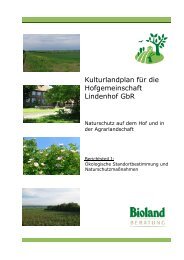the world of organic agriculture - Organic Eprints
the world of organic agriculture - Organic Eprints
the world of organic agriculture - Organic Eprints
You also want an ePaper? Increase the reach of your titles
YUMPU automatically turns print PDFs into web optimized ePapers that Google loves.
82<br />
The World <strong>of</strong> <strong>Organic</strong> Agriculture 2006<br />
India and Japan. This means that USDA would determine that <strong>the</strong>ir technical requirements<br />
and conformity assessment system adequately fulfill <strong>the</strong> objectives <strong>of</strong> <strong>the</strong> NOP, and no double<br />
certification (e.g. Australian and US) would be necessary in case <strong>of</strong> imports. Although <strong>the</strong> US<br />
announced that equivalency determinations are most complex and time-consuming and that<br />
<strong>the</strong>y expect that <strong>the</strong> negotiations with <strong>the</strong> EU take at least five years.<br />
Some countries with close trade relationships to <strong>the</strong> US, e.g. Canada, Australia and Mexico<br />
are currently revising <strong>the</strong>ir <strong>organic</strong> legislation, and it can be assumed that NOP is taken into<br />
consideration for <strong>the</strong>se revisions in order to achieve bilateral agreements in future. Although<br />
<strong>the</strong> EU Regulation and US NOP are <strong>the</strong> strongest poles to influence national standards on<br />
<strong>organic</strong> production also o<strong>the</strong>r countries passed already or are elaborating legislation on <strong>organic</strong><br />
production which are not necessarily in line with <strong>the</strong> EU or US system, e.g. Japan. It is quite<br />
likely that despite <strong>the</strong> harmonization activities initiated by IFOAM, FAO and UNCTAD, trading<br />
<strong>organic</strong> products will be become even more complicated in <strong>the</strong> next years.<br />
9.3 Private Standards<br />
In some countries in Europe, farmers’ associations had already formulated <strong>the</strong>ir private standards<br />
and labeling schemes long before national regulations came into force. These quality marks or<br />
logos, for example in <strong>the</strong> UK, in Denmark, Austria, Sweden and Switzerland, are well trusted by<br />
consumers and are one <strong>of</strong> <strong>the</strong> reasons for <strong>the</strong> current boom in <strong>the</strong> market for <strong>organic</strong> products<br />
in <strong>the</strong>se countries.<br />
Originally, private standards were more a set <strong>of</strong> guiding principles ra<strong>the</strong>r than <strong>the</strong> detailed<br />
production and processing standards prevalent today. These private standards in some elements<br />
exceed <strong>the</strong> minimum requirements stipulated by national regulations: Private standards are<br />
more demanding in <strong>the</strong> field <strong>of</strong> <strong>agriculture</strong> and in processing, too. For imported products to be<br />
awarded <strong>the</strong> private labels, all <strong>of</strong> <strong>the</strong> foreign operators (producers, processors and traders) must<br />
fulfill not only <strong>the</strong> requirements set out in EU Regulation 2092/91 or o<strong>the</strong>r national regulations,<br />
but also comply with <strong>the</strong> respective private label standards. Those private labels undertake an<br />
additional verification <strong>of</strong> compliance.<br />
Farmers’ associations published all <strong>of</strong> <strong>the</strong> earliest <strong>organic</strong> standards. Standards committees and<br />
<strong>the</strong> general assembly still develop most <strong>of</strong> <strong>the</strong>m in a democratic process. Along with publishing<br />
standards <strong>the</strong> associations <strong>the</strong>n set up systems to verify compliance with those standards. These<br />
standards provide an identity to <strong>the</strong> farmers association and help to ensure <strong>the</strong> loyalty <strong>of</strong> <strong>the</strong><br />
farmer.<br />
The private standards have determined <strong>the</strong> content <strong>of</strong> <strong>the</strong> IFOAM Basic Standards, which in<br />
turn have had a major influence on <strong>the</strong> EU Regulation 2092/91 and <strong>the</strong> Codex Alimentarius.<br />
Compared to national regulations, private standards are developed from <strong>the</strong> bottom up ra<strong>the</strong>r<br />
than imposed from above. However, since <strong>the</strong> implementation <strong>of</strong> national regulations, private<br />
standards are forced to compile with <strong>the</strong>m and state authorities more and more make standardsdecisions<br />
instead <strong>of</strong> farmers’ associations.


